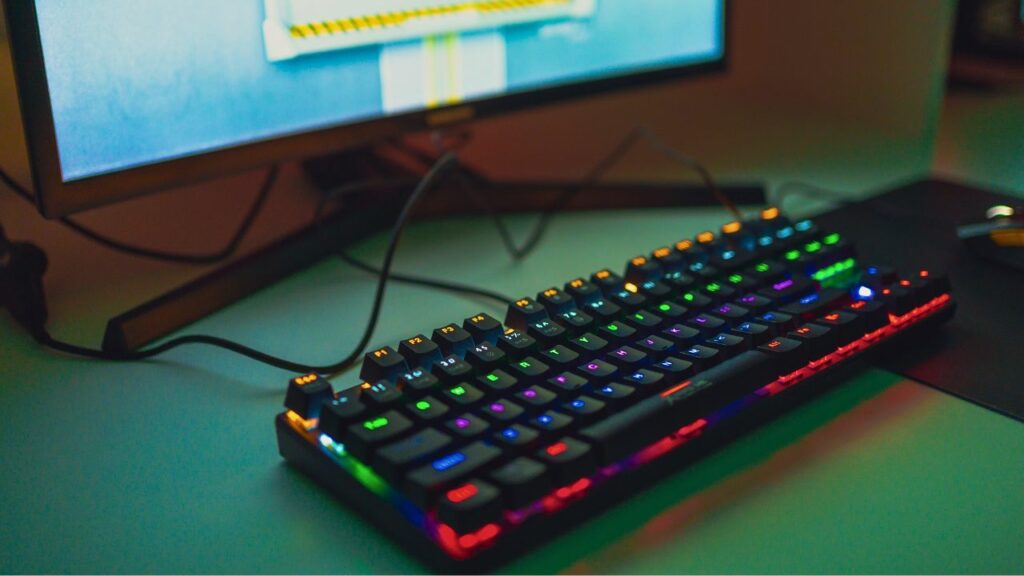
Ever wondered why your mechanical keyboard sounds like a busy typewriter, while your friend’s membrane keyboard is as quiet as a mouse? Let’s dive into the world of mechanical keyboards and find out!
The Science Behind the Sound
Mechanical keyboards are inherently louder than their traditional counterparts due to their design. Instead of using rubber domes or scissor switches, these keyboards use individual mechanical switches beneath each key. The result? A clicking sound every time a key is pressed.
The loudness of this clicking sound varies depending on the type of switch used and how hard you bash those keys. It’s not just white noise though! This sound is often considered an “audio feedback” that lets you know that your keystroke has been registered correctly.
Types of Mechanical Keyboards

There isn’t just one type of mechanical keyboard – oh no, there are several! Linear, tactile and clicky switches all offer different typing experiences and levels of sound.
Linear switches are smooth operators, offering a linear keystroke that doesn’t produce much noise unless you’re really hammering those keys. Tactile switches, like the popular Cherry MX Brown, offer more resistance and a noticeable ‘bump’ when pressed – they’re somewhat middle-of-the-road when it comes to noise.
But if you love the sound of typing, clicky switches are for you. Designed to be loud and proud with every stroke, these switches (like the infamous Cherry MX Blue) provide an audible ‘click’ when activated.
Sound Check: How Loud Are We Talking?
Now let’s talk decibels – because we know you’re curious! In general terms, mechanical keyboards average between 50 and 60 decibels (dB) during regular typing. That’s roughly equivalent to normal conversation volume – not quite as loud as your vacuum cleaner but definitely louder than a soft whisper.
Some heavy-handed typists might even reach peaks as high as 78 dB with aggressive keystrokes on certain models – similar to the volume of city traffic! But don’t worry, most offices won’t be disrupted by your mechanical keyboard; they usually hover around this decibel level anyway.
Why Choose a Mechanical Keyboard?

If they can be so loud, why do people (especially gamers) still choose to use mechanical keyboards? Well, besides their distinctive sound profile which some find satisfying (read more about it here), these keyboards are lauded for their durability and responsiveness.
Each key press offers greater accuracy due to its individual switch mechanism. Plus, these workhorses are known for their reliability and longevity – qualities that can make them worth every penny.
Making Some Adjustments
If you love everything about your mechanical keyboard but wish it was a tad quieter, don’t despair! Many models come with adjustable switches allowing you to customize the sound level to suit your needs.
In addition, there’s always the option of making some upgrades yourself. From replacing existing loud switches with quieter ones (check out some options here), lubing up those squeaky keys or even adding some sound-dampening foam – there’s plenty you can do!
The Evolution of Mechanical Keyboards
You might be wondering, “Why were mechanical keyboards designed to be louder in the first place?” The answer lies in their evolution. The original computer keyboards were modelled after typewriters, which needed to make a sound each time a key was struck to indicate that a letter had been successfully imprinted on paper. This audible feedback naturally transitioned into early keyboard designs and has stuck around ever since.
Understanding Keyboard Switches

As we mentioned earlier, the type of switch in a mechanical keyboard greatly influences its loudness. But what exactly are these switches? Each key in a mechanical keyboard has its own independent switch, comprising various parts including a base, a spring and a stem. When you press a key, it pushes down the stem, which compresses the spring until it ‘bottoms out’ and triggers an electrical signal. It’s this action that results in the satisfying click!
Linear vs Tactile vs Clicky: What’s best for you?
Choosing between linear, tactile and clicky switches largely depends on personal preference and what you use your keyboard for. Gamers often prefer linear switches as they allow for rapid-fire keystrokes due to their smooth operation. Writers or programmers might opt for tactile switches for that noticeable ‘bump’, providing assurance of a completed keystroke without much noise.
Clicky switches? They’re loved by enthusiasts who revel in the auditory typing experience – but maybe not so much by your roommates or office colleagues!
Can Loud Keyboards Impact Your Health?
There isn’t solid research directly associating loud keyboards with hearing impairment, but it’s known that continuous exposure to noise levels surpassing 70 dB could potentially result in hearing damage over the long haul. Consider this – your vigorous typing on some mechanical keyboards can hit a high note of about 78 dB! Besides, many folks find racket-filled surroundings to be stress-inducing or diverting. So, if your mechanical keyboard is a noise culprit, it might be worth contemplating toning down its clamor.
FAQ
Are all mechanical keyboards loud?
Contrary to popular belief, mechanical keyboards don’t always equate to a symphony of clicks and clacks. The volume they produce is largely influenced by the kind of switch employed and your typing force. So no worries, you can game or type away without sounding like a one-man-band.
Is There a Way to Make My Mechanical Keyboard Less Noisy?
Yes! There are several ways to reduce your keyboard’s noise level, such as replacing existing switches with quieter ones or adding sound-dampening foam.(read more about it here)
I’m new to gaming. Should I get a mechanical keyboard?
If precision and durability matter most to you, then yes! While they tend to be louder than membrane keyboards, many gamers appreciate their responsiveness and individual key-switch design. Make sure to read this to get a better overvirew of some great budget mechanical keyboards.
What is an example of a quiet mechanical keyboard switch?
The Cherry MX Silent Red is an example of a linear switch that is practically noiseless compared to other types.
In Conclusion…
Mechanical keyboards might be louder than other types but their precision and durability make them an excellent choice for many users – not least gamers who demand top performance from their gear. And remember: if things get too noisy – there are always ways to turn down the volume.